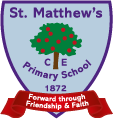
Religious Education
RE Curriculum
At St Matthew's, we follow the LDBS Religious Education curriculum, which is rooted in the Church of England’s Statement of Entitlement for RE. This curriculum ensures that all pupils receive high-quality, balanced, and inclusive Religious Education that reflects our Christian foundation, while being respectful of all faiths and world views.. RE is taught every week for 1 hour across the school. Children also spend time each week in personal reflection and prayer.
At our school, Religious Education is a central part of our curriculum and reflects our Christian vision, rooted in Jeremiah 29:11 — “‘For I know the plans I have for you,’ declares the Lord, ‘plans to prosper you and not to harm you, plans to give you a hope and a future.’” This vision inspires us to provide an RE curriculum that nurtures each child’s spiritual journey and helps them flourish with confidence, faith, and purpose.
We follow the London Diocesan Board for Schools (LDBS) RE curriculum, which is underpinned by the Church of England’s Statement of Entitlement for Religious Education. This ensures all pupils receive high-quality, rigorous, and inclusive RE that places Christianity at the heart, while also valuing and exploring other world faiths and non-religious worldviews.
Through theological enquiry and reflective practice, the curriculum enables pupils to:
-
Make sense of core beliefs, texts, and practices in Christianity and other faiths
-
Understand how beliefs influence individual lives, communities, and cultures
-
Reflect on their own values, questions, and experiences
-
Develop respect, empathy, and understanding in a diverse world
RE is treated as a core subject in our school, with weekly lessons, opportunities for deep discussion, and strong links to worship and prayer. Pupils also engage through our RE Explorers pupil leadership group, and by leading worship and visiting places of faith.
Rooted in our Christian ethos, our RE curriculum supports every child to explore big ideas, build a sense of identity and purpose, and grow into compassionate, thoughtful individuals ready to make a difference in the world.
Taken from the Religious Education in Church of England Schools - A Statement of Entitlement, the aims of Religious Education in Church schools are:
- To know about and understand Christianity as a diverse global living faith through the exploration of core beliefs using an approach that critically engages with biblical text.
- To gain knowledge and understanding of a range of religions and worldviews appreciating diversity, continuity and change within the religions and worldviews being studied.
- To engage with challenging questions of meaning and purpose raised by human existence and experience.
- To recognise the concept of religion and its continuing influence on Britain’s cultural heritage and in the lives of individuals and societies in different times, cultures and places.
- To explore their own religious, spiritual and philosophical ways living, believing and thinking
An overview of our RE curriculum can be found below.
For more information please click here. .
Assessment of RE
We use the assessment materials recommended by the LDBS for assessment of RE. Children are assessed termly by their teacher based on the learning they have done in the RE curriculum. For more information on our whole-school approach to assessment, please see our assessment policy in the 'policies' section.
It is the policy of the school and Frays Academy Trust that collective worship and Religious Education are for all.
However, parents/carers do have the right to withdraw their children from all or part of Religious Education.
Requests for withdrawal should be put in writing and addressed to the Headteacher of the school. A copy of withdrawal requests will be placed in the pupil’s educational record. The Headteacher will discuss the request with parents/carers and take appropriate action.
Alternative work will be given to pupils who are withdrawn from Religious Education.